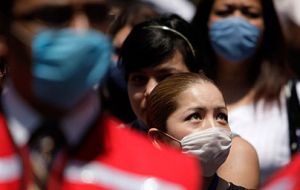MercoPress. South Atlantic News Agency
“Special powers” in Chile to drive down cases of A/H1N1 virus influenza
 At least 22 deaths related to the flu and over 9.100 cases confirmed
At least 22 deaths related to the flu and over 9.100 cases confirmed In the face of increasing numbers of hospitalizations and consultations relating to breathing problems related to flu, Chilean President Michelle Bachelet issued a decree this week giving the Health Ministry additional powers to address Chile’s current problems relating to the AH1N1 virus.
The new measures include increasing government coordination with military and private hospitals and offering government resources to certain private hospitals that agree to prioritize patients suffering from influenza-related illnesses.
The number of influenza-related deaths in Chile is 22, while confirmed cases (of which 318 are deemed serious) now total 9.135. Experts estimate that for every confirmed case there are 10 other cases, which would mean that number of infected Chileans could be around 80,000.
Although hospital admissions relating to respiratory problems have fallen in the past few days, the government expects the numbers to peak in four weeks time. In anticipation of the worsening crisis, health officials have been given additional powers to help coordinate hospitals and resources.
The government recently announced it is acquiring 600,000 more vaccines from international pharmaceutical companies, 200,000 of which will be available within the next 48 to 72 hours. They are also taking stock of the existing 700,000 vaccines to see how many have been distributed and to prevent possible abuses of the drug being used for commercial purposes.
The government has also asked universities and medical institutes to reward students who agree to help out in the crisis.
It also granted health authorities the power to cancel, with the use of the armed forces if necessary, any kind of public event that might spread the flu.
Meanwhile, across the Andes in Argentina, the number of influenza-related deaths reached 70, from its 2,485 confirmed cases, making Argentina the Latin American country worst hit by the AH1N1 virus outbreak.
Argentina replaced Canada as the third most afflicted country worldwide behind the United States and Mexico.
Still, many in Argentina fear that the real numbers of cases are much higher than the official numbers due to insufficient reporting. Others see the government’s closure of schools two weeks prior to annual holidays, the government ban on public performances until July 16 and the Catholic Church’s advice for the faithful to avoid contact during mass as signs that the crisis is much worse than the government is reporting.
Argentina has been widely criticized for being unprepared for the outbreak, despite numerous warnings. The government lacks vital respiratory equipment and vaccines needed to treat the disease and has been accused of being slow to react.
Although Argentina is reporting far fewer cases than Chile, its lack of treatment facilities, laboratories, and vaccines –coupled with the government’s delay in responding- has meant that Argentina accounts for around 75% of mortalities on the continent.
By Hannah McNeish - Santiago Times




Top Comments
Disclaimer & comment rulesCommenting for this story is now closed.
If you have a Facebook account, become a fan and comment on our Facebook Page!